初中英语语法专题--时态及感官动词
初中英语动词时态

助动词的使用 助动词本身没有意义,它只是帮助主要动词 构成谓语,表示问句、否定句、时态等。 1、表示时态 We will sing and dance at the party. 2、构成疑问句 Do you like collecting stamps? Did you study Chinese before you came to China? 3、与not合用,构成否定句 I don’t want to visit that farm. They haven’t finished the work yet.
基本句型2
状语的位置 1.孩子们玩游戏。 The children played games. 2.孩子们安静地玩游戏。 The children played games quietly. 3.孩子们在他们的房间里安静地玩游戏。 The children played games quietly in their room. 4.孩子们今天早上在他们的房间里安静地玩游戏。 The children played games quietly in their room this morning. 中文习惯于先交代时间和地点,但英语中状语往往放在主 谓结构后面,次序为:how, where ,when.
看见句子就问三个问题: 1.要用哪类动词做谓语?(主语干什么则考
虑实义动词do,主语怎么样了或者说是什么 就用系动词be) 2. 这个动作是谁发出的?人称是单数还是复 数? 3.这个动作啥时候发生的,用什么时态?
三个问题帮助大家查缺补漏。希望大家能够养成习惯,形 成条件反射
动词 形式
原形
三单式
现在 分词
be动词的用法
与名词、数词、形容词、介词连用 1) I am a doctor. 2) He is ten. 3) They are tired. 4) The cat is under the table.
初中英语语法要点总结
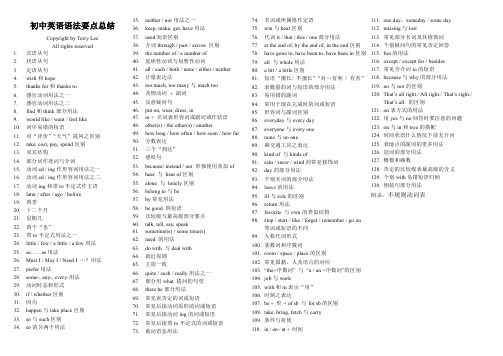
初中英语语法要点总结Copyright by Terry LeeAll rights reserved1. 宾语从句2. 状语从句3 定语从句4. wish和hope5. thanks for和thanks to6. 感官动词用法之一7. 感官动词用法之二8. find和think部分用法9. would like / want / feel like10. 词序易错的短语11. 对“评价”“天气”提问之区别12. take, cost, pay, spend区别13. 双宾结构14. 部分词作连词与介词15. 动词ed / ing作形容词用法之一16. 动词ed / ing作形容词用法之二17. 动词ing和带to不定式作主语18. later / after / ago / before19. 四季20. 十二个月21. 星期几22. 四个“也”23. 带to不定式用法之一24. little /few/ a little / a few用法25. as……as用法26. Must I / May I / Need I…? 用法27. prefer用法28. some-, any-, every-用法29. 动词时态和形式30. if / whether区别31. 因为32. happen与take place区别33. so与such区别34. so的另两个用法35. neither / nor用法之一36. keep, make, get, have用法37. used短语区别38. 介词through / past / across 区别39. the number of / a number of40. 延续性动词与短暂性动词41. all / each / both / none / either / neither42. 计量表达法43. too much, too many与much too44. 及物动词+ 副词45. 反意疑问句46. put on, wear, dress, in47. in + 名词表形容词或副词或作状语48. other(s) / the other(s) / another49. how long /how often /how soon /how far50. 分数表达51. 三个“到达”52. 感叹句53. because/ instead / out 单独使用及加of54. hear 与hear of区别55. alone 与lonely区别56. belong to与be57. by常见用法58. be good 四短语59. 比较级与最高级部分要点60. talk, tell, say, speak61. sometime(s) / some time(s)62. need 的用法63. do with 与deal with64. 就近原则65. 主谓一致66. quite / such / really用法之一67. 部分用what 提问的句型68. there be部分用法69. 常见表否定的词或短语70. 常见后接动词原形的词或短语71. 常见后接动词ing的词或短语72. 常见后接带to不定式的词或短语73. 被动语态用法74. 名词或所属格作定语75. win与beat区别76. 代词it/that/ this / one部分用法77. at the end of, by the end of, in the end区别78. have gone to, have been to, have been in区别79. all 与whole用法80. a bit / a little区别81. 短语“擅长/ 不擅长”“对…有利/有害”82. 表数量的词与短语的部分用法83. 易用错的副词84. 常用于现在完成时的词或短语85. 形容词与副词区别86. everyday与every day87. everyone与every one88. none与no one89. 乘交通工具之表达90. kind of 与kinds of91. rain / snow / wind的常见修饰词92. day的部分用法93. 个别名词的部分用法94. leave的用法95. ill与sick的区别96. return用法97. favorite与own的类似结构98. stop / start / like / forget / remember / go on等词或短语的不同99. 人称代词形式100. 基数词和序数词101. room / space / place的区别102. 常见国籍、人及语言的对应103. ―the+序数词‖ 与―a / an +序数词‖的区别104. j ob与work105. with和in表示“用”106. 时刻之表达107. be + 形+ of sb 与for sb的区别108. t ake, bring, fetch与carry109. 条件与祈使110. in / on / at + 时间111. one day,someday / some day112. m issing与lost113. 常见部分名词及其修饰词114. 个别疑问句的常见否定回答115. fun的用法116. except / except for / besides117. 常见含介词to的短语118. because与why的部分用法119. no与not的区别120. T hat’s all right./ All right./ That’s right./That’s all. 的区别121. o n表方式的用法122. 用yes与no回答时要注意的问题123. o n与in和tree的搭配124. 时间状语什么情况下前无介词125. 表地点的副词的更多用法126. 冠词的部分用法127. 概数和确数128. 否定的比较级表最高级的含义129. 个别with易错短语归纳130. 倒装句部分用法附录:不规则动词表初中英语语法及各要点总结(The 10th edition)(Copyright by Terry LeeAll rights reserved )1. 宾语从句:怎样判断出一个从句是宾语从句?○1在动词后作宾语(动宾):Do you know where he comes from? 划线部分是动词know的宾语。
初中英语语法动词及时态ppt课件
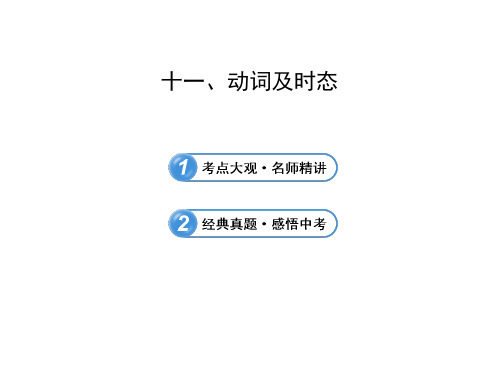
过去进行时 主语+was/were+v. -ing+其他
现在完成时 主语+have/has+过去分词+其他
中学阶段见到的其他时态 时态
构成
过去完成时 主语+had+过去分词+其他
过去将来时
现在完成 进行时
主语+would+动词原形+其他 主语+was/were going to+动词原形
主语+have/has+been+现在分词+其他
状语
【温馨提示】
(1)在含有时间状语从句的复合句中,延续时间较长的动作用过 去进行时,另一个短暂性动作用一般过去时。例如:
My pen dropped on the ground when I was walking in the park. 在公园散步的时候,我的钢笔掉到地上了。
(2)表示两个延续性动作在过去某一时刻同时进行,不考虑动作 的先后顺序,主句和从句的谓语动词都用过去进行时,连词常 用while。例如:
词
宾语,又分为及物动词和 不及物动词。
物动 run , walk , cry , 词 swim,fall,happen
连
系 连接主语和表示主语身份、be , seem , look , become ,
动
性质、状态的动词称为连 get , grow , feel , appear ,
系动词。
turn
day等频率副词或时间状语 month.
连用
我们每月都去看望刘叔叔。
用法
例句
表示客观事实或普遍真理 The sun rises in the east. 太阳在东方升起。
初中英语语法大全辅导之感官动词二.doc
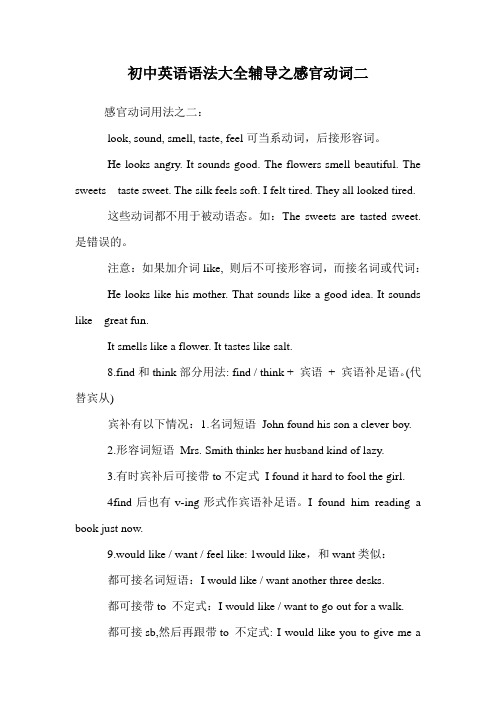
初中英语语法大全辅导之感官动词二感官动词用法之二:look, sound, smell, taste, feel可当系动词,后接形容词。
He looks angry. It sounds good. The flowers smell beautiful. The sweets taste sweet. The silk feels soft. I felt tired. They all looked tired.这些动词都不用于被动语态。
如:The sweets are tasted sweet.是错误的。
注意:如果加介词like, 则后不可接形容词,而接名词或代词:He looks like his mother. That sounds like a good idea. It sounds like great fun.It smells like a flower. It tastes like salt.8.find和think部分用法: find / think + 宾语+ 宾语补足语。
(代替宾从)宾补有以下情况:1.名词短语John found his son a clever boy.2.形容词短语Mrs. Smith thinks her husband kind of lazy.3.有时宾补后可接带to不定式I found it hard to fool the girl.4find后也有v-ing形式作宾语补足语。
I found him reading a book just now.9.would like / want / feel like: 1would like,和want类似:都可接名词短语:I would like / want another three desks.都可接带to 不定式:I would like / want to go out for a walk.都可接sb,然后再跟带to 不定式: I would like you to give me ahand.2feel like:后也可接名词短语:Do you feel like some tea?后若接动词,须用动词ing形式:Do you feel like having a walk?。
初中英语语法专题---感官动词(共15张PPT)

模块语法聚焦一
( )11.—Do you like swimming in winter? —Of course. The water ________ a bit cold at first, but then I am warm and full of energy. A.tastes B.feels C.smells D.looks ( )12.Mum is making dinner. It ________ so nice! A.smells B.tastes C.feels D.sounds
He looks tired.
他看起来累了。
These flowers smell sweet.
这些花闻起来香。
模块语法聚焦一
Her voice sounds beautiful. 她的声音听起来优美。 The cake tastes delicious.蛋糕尝起来美味。 I felt guilty.我感到内疚。 3.感官动词后可接介词like, like后可接名词或v.ing 形式。例如: That boat looks like a duck. 那条船看起来像一只鸭子。 It smells like being burnt.它闻起来像烧焦了一样。
[答案] 13D,14C,15C
模块语法聚焦一
Ⅱ.根据汉语意思完成句子 1.我的毛衣摸起来柔软。 My sweater ___f_e_e_l_s_s_o__ft_. 2.聚会听起来太吵了。 The party __s_o_u_n_d_s__n_o_i_s_y_______. 3.你妈妈看上去很年轻。 Your mother _____L_o_o_k_s__y_o_u_n_g_______. 4.汤尝起来咸了。 The soup ____T_a_s_t_e_s__s_a_l_t_y____. 5.它闻起来新鲜吗? __D_o_e_s__ it __s_m_e_l_l___f_r_e_s_h__?
初中英语知识点归纳动词的不同时态与语态

初中英语知识点归纳动词的不同时态与语态动词的不同时态与语态是初中英语的重要知识点。
掌握了动词的时态和语态,我们就能更准确地表达过去、现在和将来的动作,以及主语对动作的不同态度。
下面是对初中英语中动词的不同时态与语态的归纳总结。
一、动词的时态1. 一般现在时一般现在时表示经常性或习惯性的动作、客观真理、固定事件等。
例句:- I go to school every day.(我每天去上学。
)- The sun rises in the east.(太阳从东方升起。
)2. 现在进行时现在进行时表示现在正在进行的动作。
例句:- He is watching TV now.(他正在看电视。
)- They are playing basketball in the park.(他们正在公园里打篮球。
)3. 一般过去时一般过去时表示过去发生的动作或存在的状态。
例句:- We watched a movie last night.(昨晚我们看了一场电影。
)- She lived in Beijing when she was young.(她年轻时住在北京。
)4. 过去进行时过去进行时表示过去某个时间正在进行的动作。
例句:- They were having dinner at 7 o'clock yesterday.(昨天7点他们正在吃晚饭。
)- At this time last year, I was studying in London.(去年这个时间,我正在伦敦学习。
)5. 将来时将来时表示将要发生的动作或存在的状态。
例句:- We will go to the beach next week.(下周我们将去海滩。
)- She is going to visit her grandparents tomorrow.(她明天将要去看望她的祖父母。
)二、动词的语态1. 主动语态主动语态表示主语是动作的执行者。
2023年初中英语语法之实义动词与感官动词的用法解析
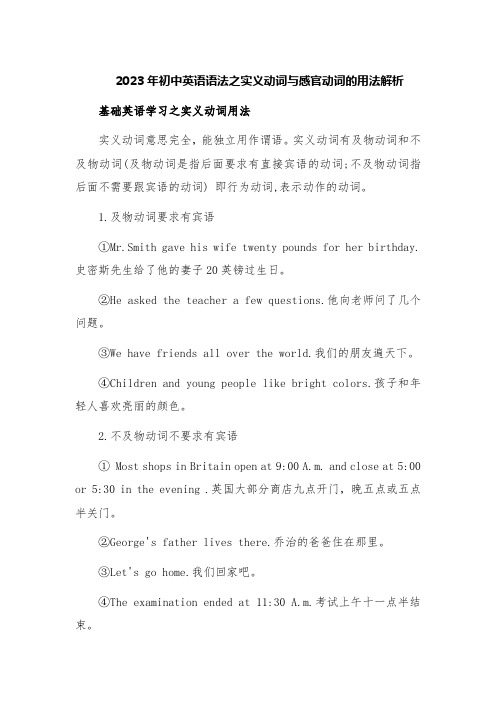
2023年初中英语语法之实义动词与感官动词的用法解析基础英语学习之实义动词用法实义动词意思完全,能独立用作谓语。
实义动词有及物动词和不及物动词(及物动词是指后面要求有直接宾语的动词;不及物动词指后面不需要跟宾语的动词) 即行为动词,表示动作的动词。
1.及物动词要求有宾语①Mr.Smith gave his wife twenty pounds for her birthday.史密斯先生给了他的妻子20英镑过生日。
②He asked the teacher a few questions.他向老师问了几个问题。
③We have friends all over the world.我们的朋友遍天下。
④Children and young people like bright colors.孩子和年轻人喜欢亮丽的颜色。
2.不及物动词不要求有宾语① Most shops in Britain open at 9:00 A.m. and close at 5:00 or 5:30 in the evening .英国大部分商店九点开门,晚五点或五点半关门。
②George's father lives there.乔治的爸爸住在那里。
③Let's go home.我们回家吧。
④The examination ended at 11:30 A.m.考试上午十一点半结束。
3.特殊实义动词英语动词很多既是及物动词又是不及物动词,如close, begin, study, leave, work等。
①The post office closes at 9:00 p. m.邮局晚上9点关门。
②Close the window,please.请关窗。
③Shall we begin now?我们现在开始吗?④ Bill began working as a sailor after he left school.比尔毕业后当水手。
感官动词及现在进行时表将来

感官动词(A)感官动词(及物动词)有:see/notic e/look at/w atch/observe/listen to/hear/feel(Vt)/taste(Vt)/smell(Vt)(B)连缀动词(含感官不及物动词) be/get/become/feel/look/sound/smell/taste/seem/appear/grow/turn/prove/go/run用法一、look, sound, smell, taste, feel,这五个动词均可作连系动词,后面接形容词作表语,说明主语所处的状态。
其意思分别为"看/听/闻/尝/摸起来……"。
除look之外,其它几个动词的主语往往是物,而不是人。
例如:These flowers smell very sw eet.这些花闻起来很香。
The tomatoes feel very soft.这些西红柿摸起来很软。
二、这些动词后面也可接介词like短语,like后面常用名词。
例如:Her idea sounds like fun.她的主意听起来很有趣。
三、这五个感官动词也可作实义动词,除look(当"看起来……"讲时)只能作不及物动词外,其余四个既可作及物动词也可作不及物动词,此时作为实义动词讲时其主语一般为人。
(和1有区别)例如: She smelt the meat.她闻了闻那块肉。
I felt in my pocket for c igarettes.我用手在口袋里摸香烟。
四、taste, smell作不及物动词时,可用于"taste / smell + of +名词"结构,意为"有……味道/气味"。
例如: The air in the room smells of earth.房间里的空气有股泥土味。
五、它们(sound除外)可以直接作名词,与have或take构成短语。
初一常用动词时态总结及例句分析

初一常用动词时态总结及例句分析动词时态是英语语法中的一个重要概念,它表示动作或状态发生的时间。
在初一阶段,学生们需要学习常用的动词时态,并掌握其正确的使用方法。
本文将对初一常用动词时态进行总结,并提供相应的例句进行分析。
一、一般现在时(Simple Present Tense)一般现在时表示经常性的动作、事实、习惯或普遍真理。
1. 动词规则变化:主语 + 动词原形(第三人称单数加s)例句:- I always go to school by bus.(我总是乘公共汽车去学校。
)- She eats breakfast every morning.(她每天早上吃早餐。
)- Dogs bark.(狗会叫。
)2. 特殊用法:- 表示现在的状态:I am a student.(我是个学生。
)- 表示经常性的真理:The sun rises in the east.(太阳从东方升起。
)二、一般过去时(Simple Past Tense)一般过去时表示过去某个时间发生的动作或状态。
1. 动词规则变化:主语 + 动词过去式例句:- I watched a movie last night.(昨晚我看了一部电影。
)- He played football with his friends yesterday.(昨天他和他的朋友们踢足球。
)- They visited their grandparents last summer.(他们去年夏天拜访了他们的祖父母。
)2. 特殊用法:- 表示过去的习惯:He always ate breakfast at 7 o'clock when he was young.(他年轻时总是在7点吃早饭。
)- 表示过去的真理:Newton discovered the law of gravity.(牛顿发现了万有引力定律。
)三、一般将来时(Simple Future Tense)一般将来时表示将来某个时间会发生的动作或状态。
人教版初中英语语法完整总结

1.see、hear、notice、find、feel、listento、lookat感官动词+sb.+dosth.eg:Ilikewatchingmonkeysjump.2.比较级and比较级表示越来越怎么样eg:themorethemore越来越多=easy小菜一碟容易赞成某人各种各样akindof一样=thewholeworld整个世界同……一道,伴随……eg:Iwillgoalongwithyou.我将和你一起去Thestudentsplantedtreesalongwiththeirteacher s.学生同老师们一起种树一怎么样就怎么样你是知道的正如你所见……求助向…要…直接接想要的东西询问某人某事asksbnottodo叫某人不要做某事在……岁时eg:Iamsixteen.=Iamattheageofsixteen. …………的起初;……的开始+地点/+时间最后;尽头;末尾eg:Attheendoftheday在每年的这个时候feelconfidentofsth/thatclause+从句感觉/对什么有信心,自信eg:Iam/feelconfidentofmyspokenEnglish. IfeelthatIcanpassthetest.+doing表:1现在进行时2将来时+v原=can+v原能够……eg:Sheisabletosing.=Shecansing..能够干什么eg:sheisabletosing.ofsth恐惧,害怕……eg:I'mafraedtogooutatnight.I'mafraidofdog.被允许做什么eg:I'mallowedtowatchTV.我被允许看电视IshouldbeallowedtowatchTV.我应该被允许看电视生某人的气eg:Don'tbeangrywithme.atsbfordoingsth为什么而生某人的气…原级…as和什么一样eg:Sheisastallasme.她和我一样高远离从……离开对什么有害eg:Readingbooksinthesunisbadforyoureyes.在太阳下看书对你的眼睛不好出生于忙于做什么事bebusywithsth忙于……当心;小心……和什么不一样以……着名对某人友好=comefrom来自eg:HeisfromBejing.HecomesfromBejing. IshefromBejingDoeshecomefromBejing装满……的befilledwith充满eg:Theglassisfullofwater. Theglassisfilledwithwater.+to+do/从句+v原将来时+doing=dowellin在某方面善长,善于……对什么有好处eg:ReadingaloudisgoodforyourEnglish.很高兴做某事对某人有好处eg:Readingaloudishelpfultoyou.大声朗读对你有好处Exercisingishelpfultoyourbody.锻炼对你的身体有好处身体健康处于困难中eg:.对某方面感兴趣=comelateto迟到eg:Belateforclass上课迟到像……eg:I'mlikemymother.生某人的气由……制成制成以后看不见原材料由……制成制成以后还看得见原材料表不确定参观受某人欢迎安静···的缩写eg:陶isshortfor陶俊杰生病在床eg:Iamsorryforyou.eg:Iamsorrytotroubleyou.严于做某事eg:He'sstrictinobeyingrules.对某人要求严格eg:Somestudentsarenotstrictwith themselves.这些学生对自己不严格某方面对某人严格被要求干什么表确定对做某事有信心eg:.对做某事有信心eg:I'msureofmyhead.myteacher我相信我的大脑老师对做某事有信心eg:I'msuerthathecanpassthetest.我相信他能通过考试一定会做某事eg:Wearesuretopassthetest.我们一定会通过这次考试WearesuretolearnEnglishwell.我们一定能学好英语+名/动doing害怕……害怕做某事…和什么一样习惯做某事eg:Myfatherisusedtogettingupearly.我爸爸习惯早Heisusedtosleepinginclass.他习惯上课睡觉值-得做什么feelafraidtodosth害怕做某事beafraidofsth害怕某物beafraidthat丛句+句子becauseof+短语eg:Hewaslatebecausehehadaheadache. Hewaslatebecauseofhisheadache.=starttodo开始做某事start…with…=begin…with…以什么开始什么eg:Let'sbeginthegamewiththesong. Ibegintogohome…and…两者之间向……借……lendsthtosblendsbsth借给……什么东西eg:Iborrowedapenfromhimhelentapentome.Helent meapen.=thesameas=notdifferentfrom表相同打扰bothersbtodostheg:I'msorrytobotheryou,butcanyoutellmetowayt othestation.我十分道歉打扰你,但是你能告诉我怎么去车站Theproblemhasbeenbotheringmeforweeks.这个问题困扰了我几个周了He'sbotheringmetolendhimmoney.到……为止:Wecallhimold wang.关心eg:Don'tyoucareaboutthiscountry'sfuture你为什么不关心国家的未来赶上某人和某人闲谈进过来提出eg:Canyoucomeupwithagoodidea你能想出一个好办法吗和某人交流+doing考虑做什么eg:Whynotconsidergoingtoluzhou.为什么不考虑去泸州随着……跳舞eg:Shelikesdancingtothemusic.她喜欢随着音乐跳舞决定做某事做某方面的调查在……方面做得更好做错'tforgettodosth不要忘了做某事'tmind+doing/从句/名词不要介意……+名单每一个…eg:Eachstudenthasmanybooks.每一个学生都有一些书+doing+doing喜欢从……逃跑eg:Theprisonershaveescapedfromtheprison.犯人从监狱里逃跑出来期待做某事摔下来falloff从哪摔下来sth爱上什么离某地远eg:Theschoolisfarfrommyhome.+it+adj.+todo发现做某事怎么样sth+adj.发现什么怎么样eg:Ifindthebookinteresting.完成+doing名词=befitforsb适合某人没有做而忘了forgetdoing做了而又忘了eg:Don'tforgettogohome,Iforgetclosingdoor. …to…从某某到某某eg:Frommetoherhavesthdown做完,被别人做…eg:Ihavemyhaircut.我理了发头发被剪了Tomgothisbadtoothpulledout.汤母把他的坏牙拔掉了被牙医拔掉了==getonwellwithsb与某人相处得好=getonwithsb与某人相处=bereadyfor为什么而准备eg:Igetreadyformathexam. Iamreadyformathexam.给某人制造麻烦,使某人陷入麻烦…from…从某处得到某物做报告eg:Heisgiveatalk.给某人某物钓鱼goswimming游泳去做下一件事goondoing继续做这件事=gooutof上学用于专业的gototheschool去学校不一定是上学好方法讨厌没做过的事hatedoing讨厌做过的事举办谁的晚会听报告谈一谈现在完成进行时eg:YouhavebeentalkingYouhavebeensleepingsinc e.…地方……去过某过地方havegoneto…地方去了某地还没回来+doing玩得高兴有什么事要做eg:Ihavealotofhomeworktodo.我有很多家庭作业要做Ihavenothingtodo.我没什么事情做必须做某事problemindoingsth做什么事情有麻烦…time+doing…时间…off放……假eg:Ihavemonthoff我请一个月得假+do/doing听见某人做某事/正在做某事很大用处\one'ssth帮助某人某事某方面helpsbtodosth帮助某人做某事希望做某事+doing=Whatabout+doing=whatdoyouthinkof你对什么的看法:是否=wethereg:Idon'tknowifwetherIshouldgototheparty.我不知道我是否应该去参加晚会Hedon'tknowifwetherwewillarriveontimetomorro wmorning.他不知道我们明天早上是否能准时到达:如果,假如全部接一般时态+条件语态从句eg:I'llgotoLuZhouifitdoes'train.假如明天不下雨,我就去泸州Iftheychangetheplantheywillletmeknow.假如他们要改变计划,他们会让我知道的I'llgotoEngland,ifIhaveenoughmoneynextyear.如果我明年由足够的钱,我就要去英国'sopinion=sbthink某人认为在某些方面=finallyadv最后…什么在什么的北方north北sowth南west西east 东在太阳下增加eg:They'veincreasedthepieceofpetrolby3%.他们把石油价增加了3%Thepopulationhas increasedfrom12milliontenyea rsago to18millionnow.+名代替eg:I'dlikeanappleinsteadofapear.我想要苹果,而不要梨子IlikeEnglishinsteadofmath.我喜欢英语而不喜欢数学介绍某人给某人introduceoneself自我介绍邀请某人做某事做某人花掉某人多少时间eg:Ittookme5minutestodomyhomework. Ittakesmehalfanhourtocook.'s+adj+forsbtodosth对某人来说做某事怎么样's+adj+todo做某事怎么样's+adjforsb对于某人来说怎么样It's+adjofsb对某人来说太怎么样's+adjforsbtodo对某人来说做某事怎么样It's+adjofsbtodosth对某人来说做某事太怎么样eg:It'sniceofyoutohelpmewithmyEnglish.'sagoodideaforsbtodosth对……来说是个好主意'simportanttosb对某人来说很重要eg:It'simportanttome.'stimetodosth=It'stimeforsth到了该去做某事的时间eg:It'stimetohaveclassIt'stimeforclass.该去上课了=takepartin参加刚才+sb/sth+adj/介词短语让什么保持什么样不让……进入让……保持……eg:Iwanttokeepmymotherhappy/keephealthy.保持高兴/健康+名词表示:某物的钥匙或某题的答案…key可以是答题或钥匙anserto……取笑……eg:Don'tlanghatothers.Welanghedatthejoke.自学向某人学习eg:WeshouldlearnfromLeiFeng.学做某事让某人做某事让某人失望eg:Weshouldn'tletourfarentsdown.我们不应该让我们的父母失望:离某地远+大地方/at+小地方居住在某地eg:.=takecareof照顾照看'sway谁迷路eg:Loseyourway.你迷路了决定做某事和谁成为朋友eg:Iwanttomakefriendswithyou.把时间定的早一点让某人出洋相n+n使什么成为什么eg:Imadeyoumywife.sth+adj使某人某物怎么样eg:Youmustmadeyourbedclean.sthadj使某人/某物怎么样让某人做某事eg:Imadehimwrite.我以前让他写被动语态由……组成…differenceto…'sdoing介意……做什么+名mostof+代+形容词一定+名词需要某人做某事实义动词needdo情态动词neithrofhatetodono/neithrofhatedoing+名词=nomore再也不……eg:Hedidn'tcryanymoreHecriednomore.他再也不哭…形、副atalleg:He'snottallatallshedoesn'tjunpfaratall. …atall一点都不…either表否定,也不eg:Idon'thavesister,either.我也没有姐姐…unti l直到……才……eg:Ididn''tstopcryinguntilIgivehersugar. providesbwithsth给某人提供offersthtosb提供什么东西给某人eg:Iofferyouwater.Iofferwatertoyou.我给你提供水'swayto…在谁去那的路上一方面ontheotherhand另一方面=overthephone用电话交谈准时intime及时=someday=someday一天,有一天+可数名词的复数形式一个到另一个一遍又一遍的eg:Hecleanedtheflooroverandoveragin.兼职工作fall-timejob全职工作…付……钱paythebill开钱,付钱+do=poreinto+doing练习做某事相对……更喜欢……eg:Ipreferphysicstochemisty.在物理和化学中,我更喜欢物理preferdoingtosth更喜欢去做…不愿意去做…eg:Heprefersridingabiketodiving.他更喜欢骑自行车,不开小车prefertodosthratherthandosth宁愿做…也不愿eg:Myundepreferstobuyanowcarratherthanrepaiv theusedone.我叔叔更喜欢买新的车,也不去修旧车prefersbnottodosth更愿意…eg:Ipreferhernottocome我不喜欢她不来装着去做什么pretendthat从句eg:Thetwocheatspretendedtobeworkingveryhard.这两个骗子装着努力工作Hepretendedthathedidnotknowtheanswer.他装着不知道答案…than宁可……也不……eg:Iwouldratherbeadoctorthanateacher.我愿肯当医生,也不当老师Helikesdogsratherthancats.他喜欢狗,不喜欢猫…as把……当作……eg:Pleasegivemybestregardstoyourfamily.请带我向你的家人我最好的问候Iregardyouasmyfriend.我把你当作我的朋友Heshowslittleregardforothers.他不爱关心别人提醒某人什么事remidsbtodosth提醒某人做某事eg:heremidsmeaboutcookingHeremidsmetocook.他提醒我做饭使某人想起什么eg:Thepicturesremindmeofmyschooldays.这照片使我想起了我的学校T hewor dsthatwhichtheteachertalketoremindmeof mymother.还什么东西给某人对自己说对某人说花了多少钱在某事上花了多少时间陪谁indoingsth花了多少时间做某事+issbandsb+are看见某人做过某事seesbdoing看见某人正在做某事be+adj显得怎么样eg:.+sbsth送给某人某物…to…把什么寄到哪里去使……震惊eg:Oh,It'sonlyyouYougivemeashock.啊,是你呀吓我一跳向某人展示某物eg:Ishowherthebook.=showsthtosb拿什么东西给某人看eg:Showmeyourpen.=Showyourpentome.向某人展示某物eg:Ishowthebooktoher.…others…一些……另一些………with…从……开始begin…with…从……开始远离……eg:We'retoldtostayawayfromtheanimalswhevisit ingthezoo.当我们参观zoo时,我们要远离动物Ifyouwanttoloseweightyou'dbetterstayauayfrom thesweetfood.如果你想减肥,你最好远离甜食停下正在做的事阻止某人做某事fromdoing阻止某人做某事停下正在做的事去做下一件事+名这样,这种适合某人使某人惊奇toone'ssurprise令某人惊奇上课把某人带去eg:Itakeyoutothehospital.=takeawalk=goforawalk散步256.①talkto对谁说eg:Italktoyou.②talkwith和谁说eg:Italkwithhim.③talkof谈到eg:wetalkedofyou.④talkabout谈论关于……和某人说话教某人做某事告诉某人做某事丛句tellsbnottodosthtellastory告诉某人某事告诉某人做什么tellsbnottodosth告诉某人不要做什么…from…+doing+名词doing+as………名…asas…adjadv…as相同=thewayofdoingsth做某方面的方法thewayto+地方去哪的路eg:DoyouknowthewaytolearnEnglish. DoyouknowthewayoflearningEnglish.…地点到哪的…to…太怎样而不能……adj+enoughto足够…能…so…that+丛句eg:Heistooyoungtogotoschool.=Heissoyoungthathecan'tgotoschool Heisoldenoughtogotoschool.=Heissooldthathecangotoschool. ……into……把什么翻译成什么eg:TrasalteEnglishintochinese.和某人去旅游'sbesttodosth尽某人最大的努力去做某事eg:想干什么,但没成功trydoingsth想干什么,已经做过了eg:Hetriedtoclimb.他想爬上去但没成功Hetriedclimbing.他想爬上去已经做过了…试衣服haveatry试一下开小←→turnup开大关上←→turnon打开open拆开倒着…参观某个地方等某人。
初中易考知识点动词的时态与语态

初中易考知识点动词的时态与语态初中易考知识点:动词的时态与语态动词是语言中非常重要的一部分,它用来表达一个动作、状态或者是存在。
在初中英语学习中,时态与语态是重要的考点之一。
本文将详细介绍初中英语中动词的时态与语态的知识点。
一、动词的时态1.一般现在时(Simple Present Tense)一般现在时表示经常性的、习惯性的动作或者真理,常与时间状语词如always,often,usually,sometimes等连用。
例如:- I go to school every day.- She often plays basketball on weekends.2. 现在进行时(Present Continuous Tense)现在进行时表示正在进行的动作。
例如:- They are watching TV at the moment.- We are studying English now.3. 一般过去时(Simple Past Tense)一般过去时表示过去某个时间发生的动作或者存在的状态,常与时间状语词如yesterday,last week,two days ago等连用。
例如:- He studied hard last night.- We went to the park on Sunday.4. 过去进行时(Past Continuous Tense)过去进行时表示过去某个时间正在进行的动作,或者过去某个时间段内一直在进行的动作。
例如:- They were playing soccer when it started to rain.- I was sleeping when he called me.5. 现在完成时(Present Perfect Tense)现在完成时表示过去发生并与现在有关的动作,或者过去某一时刻开始一直延续到现在的动作,常与时间状语词如already,yet,just等连用。
八年级掌握常见的动词时态和语态
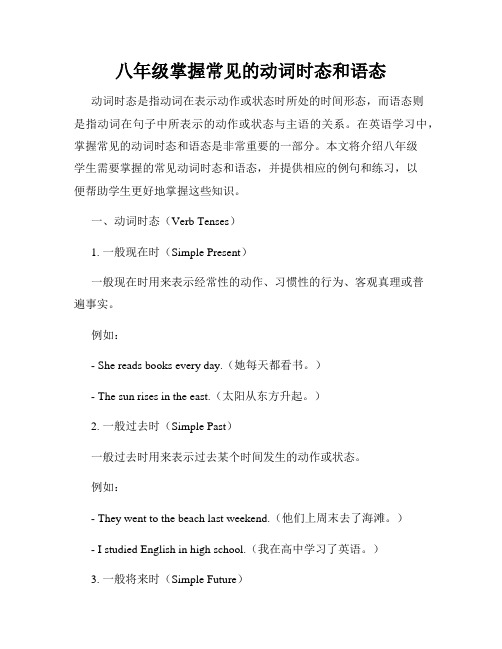
八年级掌握常见的动词时态和语态动词时态是指动词在表示动作或状态时所处的时间形态,而语态则是指动词在句子中所表示的动作或状态与主语的关系。
在英语学习中,掌握常见的动词时态和语态是非常重要的一部分。
本文将介绍八年级学生需要掌握的常见动词时态和语态,并提供相应的例句和练习,以便帮助学生更好地掌握这些知识。
一、动词时态(Verb Tenses)1. 一般现在时(Simple Present)一般现在时用来表示经常性的动作、习惯性的行为、客观真理或普遍事实。
例如:- She reads books every day.(她每天都看书。
)- The sun rises in the east.(太阳从东方升起。
)2. 一般过去时(Simple Past)一般过去时用来表示过去某个时间发生的动作或状态。
例如:- They went to the beach last weekend.(他们上周末去了海滩。
)- I studied English in high school.(我在高中学习了英语。
)3. 一般将来时(Simple Future)一般将来时用来表示将来某个时间会发生的动作或状态。
例如:- We will have a party tomorrow.(明天我们将举行派对。
)- He will visit his grandparents next week.(下周他将去看望他的祖父母。
)4. 现在进行时(Present Continuous)现在进行时用来表示现在正在进行的动作或状态。
例如:- They are playing basketball in the park.(他们正在公园里打篮球。
)- I am studying for the exam.(我正在为考试学习。
)5. 过去进行时(Past Continuous)过去进行时用来表示过去某个时间正在进行的动作或状态。
例如:- She was watching TV when I called her.(当我给她打电话时,她正在看电视。
(详细版)初中英语动词时态和语态讲解
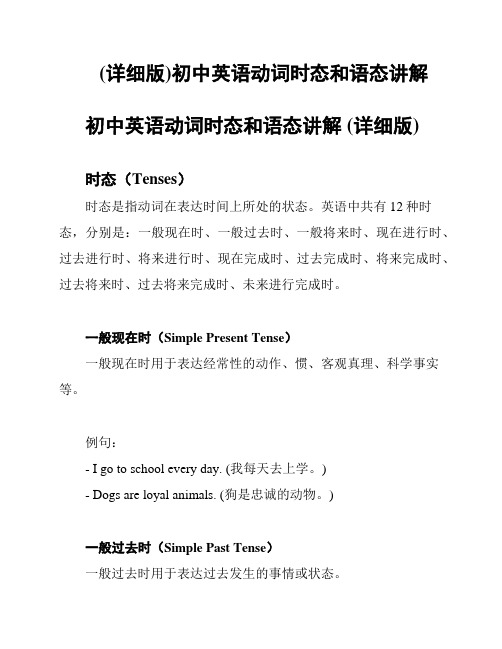
(详细版)初中英语动词时态和语态讲解初中英语动词时态和语态讲解 (详细版)时态(Tenses)时态是指动词在表达时间上所处的状态。
英语中共有12种时态,分别是:一般现在时、一般过去时、一般将来时、现在进行时、过去进行时、将来进行时、现在完成时、过去完成时、将来完成时、过去将来时、过去将来完成时、未来进行完成时。
一般现在时(Simple Present Tense)一般现在时用于表达经常性的动作、惯、客观真理、科学事实等。
例句:- I go to school every day. (我每天去上学。
)- Dogs are loyal animals. (狗是忠诚的动物。
)一般过去时(Simple Past Tense)一般过去时用于表达过去发生的事情或状态。
例句:- We visited Paris last summer. (去年夏天我们参观了巴黎。
)- She lived in Japan for two years. (她在日本住了两年。
)一般将来时(Simple Future Tense)一般将来时用于表达将来将要发生的事情或状态。
例句:- I will call you tomorrow. (我明天会打电话给你。
)- They are going to travel to Europe next month. (他们下个月要去欧洲旅行。
)现在进行时(Present Continuous Tense)现在进行时用于表达正在进行的动作。
例句:- She is studying for her exams. (她正在为考试而研究。
)- They are playing soccer in the park. (他们正在公园里踢足球。
)过去进行时(Past Continuous Tense)过去进行时用于表达过去某个时间正在进行的动作。
例句:- We were watching a movie when the power went out. (停电时我们正在看电影。
初中英语语法大全(总结篇)

1(see 、hear 、notice 、find、feel 、listen to、look at(感官动词)+do eg:Ilike watching monkeysjump 2 (比较级and 比较级) 表示越来越怎么样 3 a pieceofcake =easy 小菜一碟(容易)4agreewith sb 赞成某人5 all kinds of各种各样akindof 一样6all over theworld =the whole world整个世界7alongwith同……一道,伴随……eg: I will go alongwith you我将和你一起去the studentsplantedtrees along with theirteachers 学生同老师们一起种树8 As soon as 一怎么样就怎么样9as youcansee你是知道的10ask for ……求助向…要…(直接接想要的东西)eg: askyou for mybook11ask sb for sth 向某人什么12asksbto do sth 询问某人某事ask sb notto do 叫某人不要做某事13 at theage of 在……岁时eg:I am sixte enIam at the ageof sixteen 14atthe beginning of …………的起初;……的开始15at the endof +地点/+时间最后;尽头;末尾eg :Atthe endof the day 16at this time of year 在每年的这个时候17 be /feel confidentof sth/that clause +从句感觉/对什么有信心,自信eg:I am /feel confident of myspokenEnglish I feelthat I can pass the test 18 be + doing表:1 现在进行时2将来时19be ableto (+ v 原)=can(+ v原)能够…… eg:She is able tosing She cansing20be ableto do sth 能够干什么eg:she is able to sing21 be afraid to do (of sth 恐惧,害怕…… eg : I’m afraed to go outatnight I'mafraid of dog22be allowedtodo 被允许做什么eg:I'm allowed to watch TV 我被允许看电视Ishould be allowedto watchTV 我应该被允许看电视23beangry withsb 生某人的气eg : Don’t be angrywith me 24 be angry with(at) sbfor doing sth为什么而生某人的气25 be as…原级…as 和什么一样eg: She is as tallas me 她和我一样高26beashamedto27 be away from 远离28be away from 从……离开29 be bad for 对什么有害eg :Readingbooksin thesun is bad for youreyes 在太阳下看书对你的眼睛不好30 be born出生于31bebusy doing sth 忙于做什么事bebusy with sth忙于……32 becareful 当心;小心33bedifferent from…… 和什么不一样34be famous for以……著名35befriendly to sb 对某人友好36be from = come from来自eg:He isfrom BejingHe comes from Bejing Is hefromBejing ?Does hecomefromBejing? 37befull of装满……的befilled with 充满eg:the glass is fullof water the glassis filled withwater38 be glad+to+do/从句39be going to +v(原) 将来时40 be good at(+doing)= dowell in在某方面善长, 善于……41 be good for 对什么有好处eg:Reading aloud isgood for your E nglish42be happyto do 很高兴做某事43 be helpful to sb 对某人有好处eg: Reading aloud ishelpful toyou 大声朗读对你有好处Exercising is helpful to y our bady 锻炼对你的身体有好处44 be in good health 身体健康45 be introuble处于困难中eg : She isin trouble Theyare in tronble46 be interestedin 对某方面感兴趣47belate for= comelateto迟到eg: Be late for class上课迟到481be like 像……eg: I’m like my mother49be madat生某人的气50 be madefr om 由……制成(制成以后看不见原材料) 51 be made of 由……制成(制成以后还看得见原材料) 52 be notsure 表不确定53 be on a visitto 参观54be popular withsb 受某人欢迎55be quiet安静56be short for表**的缩写eg:陶isshort for陶俊杰57 besickin bed 生病在床58besorryto do sthbe sorry for sbeg : I am sorry for you 59 besorryto hearthat60 be sorry totroublesb eg : I am sorry to troubleyou 61bestrict in doingsth 严于做某事eg: He'sstrict in obeying noles 62 be strictwith sb 对某人要求严格eg: Some studentsare not strict withthemselves 这些学生对自己不严格63 be strict withsbin sth某方面对某人严格64 besupposed to do 被要求干什么65 besure 表确定66be sureofdoing sth对做某事有信心eg: He issureof winning I am sure oflearning English well 67be sure of sth对做某事有信心eg: I’msure of myhead(my teacher我相信我的大脑(老师) 68 be sure that sth 对做某事有信心eg:I'm suerthat he can pass the test 我相信他能通过考试69 be sure to do sth一定会做某事eg:We are sure to pass thetest 我们一定会通过这次考试We are sure tolearn Englishwell我们一定能学好英语70be terrified of + 名/动doing 害怕……71beterrified to dosth 害怕做某事72bethe sameas…和什么一样73 beused to doing sth 习惯做某事eg: My father is used togetting upearly我爸爸习惯早Heis used to sleeping inclass 他习惯上课睡觉74 be worth doing 值得做什么75 be(feel) afraid to dosth 害怕做某事be afraid of sth 害怕某物be afraid th at丛句76 because+句子because of +短语eg :He waslate because he had a headache He was late because of his headache77begin to do =start to do开始做某事start…with…=begin…with… 以什么开始什么eg :Let’s begin the gamewith the songI begin togo home 78 between…and… 两者之间79 borrowsth from sb 向……借…… lendsthtosb ( lend sb sth 借给……什么东西eg :I borrowed apen fromhimhe lent a pen to me(he lentme a pen80both= thesame(as)=not different(from)表相同81 bother打扰bot her sbto dosth eg:I'm sorrytobotheryou ,but can you tellmeto waytothe station 我十分道歉打扰你,但是你能告诉我怎么去车站the problem has beenbothering me for weeks 这个问题困扰了我几个周了He’s bothering me to lend himmoney82 by the end of到……为止83call sbsth eg : We call him old wang 84 care 关心eg :Don’t you careabout this country’s future?你为什么不关心国家的未来85 catch up withsb赶上某人86 chat with sb和某人闲谈take sb to + 地点带某人去某地87come in 进88 comeoverto过来89 come up with提出eg: Can you come up with a2good idea 你能想出一个好办法吗?90 communicate with sb 和某人交流91consider + doing 考虑做什么eg:Why not consider goingto luzhou为什么不考虑去泸州? 92 dance to 随着……跳舞eg: She likesdancing tothemusic她喜欢随着音乐跳舞93decide to do sth 决定做某事94do a survey of做某方面的调查95 do better in 在……方面做得更好96dowrong 做错97 Don’t forget to do sth 不要忘了做某事98Don’t mind +doing/从句/名词不要介意……99each +名(单)每一个…eg : Each st udent hasmany books 每一个学生都有一些书100 end up +doing101 enjoy +doing喜欢102 escape from 从……逃跑eg:The prisoners have escapedfrom the prison 犯人从监狱里逃跑出来103expectto do sth 期待做某事104fall down 摔下来fall off从哪摔下来105fall in lovewith sb /sth 爱上什么106 far from 离某地远eg :The schoolis far from myhome107find +it +adj+to do发现做某事怎么样108 find sb/sth +adj发现什么怎么样eg:I find thebookinteresting109finish完成+doing(名词)110fit to sb=be fit for sb 适合某人111 forget to do没有做而忘了forget doing 做了而又忘了eg: Don’t forget to go home Iforget closingdoor112from…to…从某某到某某eg: From me for her 113 get/have sth down做完,被(别人)做…eg:I have my haircut 我理了发(头发被剪了)Tomgot hisbad tooth pulled out 汤母把他的坏牙拔掉了(被牙医拔掉了)114get apart—time job= find apart—time job115getalong well with sb = getonwell with sb 与某人相处得好116 get alongwithsb = get on withsb 与某人相处117get ready for =be readyfor为什么而准备eg :Iget readyfor mathIam readyfor math 118 get sb in to trouble给某人麻119get sb todo sth 120 get…from… 从某处得到某物121 give a talk做报告eg: Heis give a tall 122 give sth to sb givesb sth 给某人某物123go fish 钓鱼go swimming游泳124 go on to do去做下一件事go ondoing继续做这件事125go outawayfromgo out of 126gotoschool 上学(用于专业的)go tothe school 去学校(不一定是上学)127goodwayto好方法128 hate to do讨厌没做过的事hatedoing讨厌做过的事129 haveaparty for sb 举办谁的晚会130have atalk听报告谈一谈131 havebeen doing 现在完成进行时eg:Y3ouhave beentalking Youhave been sleeping since 132have been to …(地方)……去过某过地方have gone to …(地方)去了某地还没回来133 have fun+doing玩得高兴134 have sth todo 有什么事要做eg: I have a lotofhomework todo我有很多家庭作业要做Ihave nothingto do 我没什么事情做135 have to dosth必须做某事136 have trouble (problem) (in) doing sth 做什么事情有麻烦137have…time +doing138 have…(时间)…off 放……假eg:I have month off我请一个月得假139 hear sb+do/doing 听见某人做某事/正在做某事140 help a lot 很大用处141 help sb withst h\one'ssth 帮助某人某事(某方面)help sb(to) do sth 帮助某人做某事142 ho pe to dosth 希望做某事143How about(+doing) = What about(+doing)144how do you like= what do youthink of 你对什么的看法145 if : 是否=wether eg: I don'tknow if (wether) Ishould go to theparty 我不知道我是否应该去参加晚会Hedon’t know if (wether)wewill arrive on timetomorrow morning他不知道我们明天早上是否能准时到达146if:如果,假如(全部接一般时态)+条件语态从句eg: I'll go to LuZhouif it does't rain假如明天不下雨,我就去泸州If theychangethe plan they willlet me know 假如他们要改变计划,他们会让我知道的I’ll go to Eng land ,if Ihave enough money next year 如果我明年由足够的钱,我就要去英国147inone's opinion=sb think 某人认为148in some ways在某些方面149in the end =finally(adv) 最后150in the north of… 什么在什么的北方(north北sowth 南west 西east 东) 151 in the sun 在太阳下152increase增加eg :They’veincreased the prece of petrol by3% 他们把石油价增加了3% the population has inc reased from 12 million tenyearsago to18million now153 instead of +(名)代替eg:I'd like anapple instead of a pear 我想要苹果,而不要梨子Ilike Engl ish instead of math我喜欢英语而不喜欢数学154 introduce sb to sb 介绍某人给某人introduceoneself 自我介绍155invite sb todo sth邀请某人做某事156 Ittakes sb sometimetodo sth 做某人花掉某人多少时间eg: It took me 5 mi nutes todo myhomework It takesme half an hour to cook157 It’s+adj +fo rsb to do sth 对某人来说做某事怎么样158 It's +adj +to do 做某事怎么样159It’s +adj for sb 对于某人来说怎么样It's +adj of sb 对某人来说太怎么样160 It's +adj(for sb) to do(对某人来说)做某事怎么样It’s+adjof sbto do sth 对某人来说做某事太怎么样eg :It's niceof you to helpmewith my English 161 It’s a good idea for sb to do sth 对…… 来说是个好主意162 It's importantto sb 对某人来说很重要eg:It's important to me 163 It'stime to do sthIt'stimeforsth到了该去做某事的时间eg:It’s timeto have class It’stime for class该去上课了164 join = takepart in 参加165 just now 刚才166keep+sb/sth+adj/介词短语让什么保持什么样?167 keep out 不让…… 进入168 keep sb adj让……保持…… eg: I want to keep my motherhappy keephealthy 保持健康169key to +名词表示:某物的钥匙或某题的答案170 key to… anserto …key可以是答题或钥匙171 laugh at… 取笑…… eg:Don'tlangh at othersWe langhedatthe joke 172learn byoneslfe自学173 learn from sb 向某人学习eg:Weshouldle4arnfromLeiFeng174 learn to do sth 学做某事175 let sbdo sth 让某人做某事176Letsbdown 让某人失望eg:We shouldn’tletour farentsdown 我们不应该让我们的父母失望177 live from :离某地远178 live in+大地方/at +小地方居住在某地eg: I live in LuZhou She lives at XuanTan179 lookafter=take care of 照顾照看180lose one'sway谁迷路eg: Loseyour way 你迷路181 make a decision to do sth 决定做某事182makefriends with sb和谁成为朋友eg :I want tomake friends with you183 make it early把时间定的早一点184makeon exhibition of oneself让某人出洋相185make sb/n +n 使什么成为什么eg : Imade her my step moller I madeyou my wife186 make sb/sth +adj 使某人(某物)怎么样eg: You must madeyour bed clean 187make sb/sthadj 使某人/某物怎么样188make sbdosth 让某人做某事eg :I madehim write 我以前让他写189make upbemadeup of (被动语态)由……组成190 make…difference to…191 mind sb todo mindone’s doing 介意……做什么192 most +名most of+代193much too +形容词194must be一定195 need+名词196need sbdo sth 需要某人做某事197need todo(实义动词)need do (情态动词) 198 no /neithr of hate to do no/neithr ofhatedoing 199no+名词200 not anymore =no more 再也不…… eg: Hedidn’tcry any more He cried no more 他再也不哭201 not…(形、副)at all eg:He’s not tall atallshedoesn’t junpfar at all 202 not…at all一点都不203not…either 表否定,也不eg : Idon’t japanse either I don’t havesister,either 我也没有姐姐204not…until直到……才……eg:Ididn’t sleep until mymother came backThe childdidn’t stop crying until I gi veher sugar205offer / provide sb with sth 给某人提供206 offer sbsth(offer sth to sb 提供什么东西给某人eg:I offeryouwater(I offer water to you我给你提供水207onone’s way to… 在谁去那的路上208 onthe one hand一方面on the otherhand 另一方面209 onthe phone=over the phone用电话交谈210 on time 准时in time 及时211 one day=some day =someday 一天,有一天212one of +可数名词的复数形式213 one toanother 一个到另一个214 overand over agin 一遍又一遍的eg: He cleaned the floor over and over agin 215 part—timejob 兼职工作fall-timejob全职工作216pay for… 付……钱pay the bill开钱,付钱217please +do 218 pleasehelp yourself 219 pleasedwith sb220 pool into =pore into 221practice +doing练习做某事222prefer sth tosth相对……更喜欢…… eg : I prefer physics to chemisty在物理和化学中,我更喜欢物理prefer doing to sth 更喜欢去做…不愿意去做… eg:Heprefers riding a bike to diving 他更喜欢骑自行车,不开小车preferto do sth rather than do sth 宁愿做…也不愿eg: Myunde prefers tobuyanow car rather thanrepaiv theused one 我叔叔更喜欢买新的车,也不去修旧车prefersb not to do sth 更愿意… eg: I prefer hernotto come我不喜欢她不来223pretend to dosth装着去做什么pretendthat从句eg: Thetwocheatspretendedto beworking veryhard5这两个骗子装着努力工作Hepretendedthat hedid not know the answer 他装着不知道答案224 rather…than 宁可……也不……eg :Iwouldrather be a doctor th an a teacher 我愿肯当医生,也不当老师Helikesdogsrather than cats他喜欢狗,不喜欢猫225 regard…as把……当作……eg: Please give my best regardstoyourfamily请带我向你的家人我最好的问候Iregard you asmyfriend 我把你当作我的朋友He shows little regard for others 他不爱关心别人226 remid sbabout sth 提醒某人什么事remid sb todo sth 提醒某人做某事eg : he remids meabout cooking(he remids me to cook他提醒我做饭227 remid sbof sth使某人想起什么eg :the pictures remind me ofmy school days这照片使我想起了我的学校thewords that(which)the teacher talke to remind me of my mother 228 returnsth to sb 还什么东西给某人229 say tooneself 对自己说230 say tosb对某人说231 sb spend somemoney on sth花了多少钱在某事上232 sbspend sometime withsb花了多少时间陪谁233 sb spend sometime(in) doing sth花了多少时间做某事234sb withsb +is sband sb+are235 see sbdo 看见某人做过某事see sb doing看见某人正在做某事236 seem todo/be +adj显得怎么样eg :You seem to betiredYouseem to be happy 237 send +sb sth 送给某人某物238 send…to…把什么寄到哪里去?239 shock使……震惊eg : Oh ,It’s only you ! You give meashock 啊,是你呀!吓我一跳240 showsbsth 向某人展示某物eg :I show her the boo k。
初中重要知识点归纳动词时态与语态的用法总结
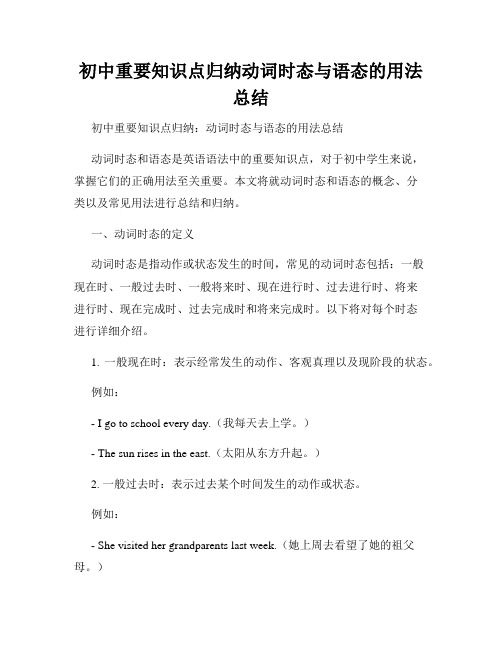
初中重要知识点归纳动词时态与语态的用法总结初中重要知识点归纳:动词时态与语态的用法总结动词时态和语态是英语语法中的重要知识点,对于初中学生来说,掌握它们的正确用法至关重要。
本文将就动词时态和语态的概念、分类以及常见用法进行总结和归纳。
一、动词时态的定义动词时态是指动作或状态发生的时间,常见的动词时态包括:一般现在时、一般过去时、一般将来时、现在进行时、过去进行时、将来进行时、现在完成时、过去完成时和将来完成时。
以下将对每个时态进行详细介绍。
1. 一般现在时:表示经常发生的动作、客观真理以及现阶段的状态。
例如:- I go to school every day.(我每天去上学。
)- The sun rises in the east.(太阳从东方升起。
)2. 一般过去时:表示过去某个时间发生的动作或状态。
例如:- She visited her grandparents last week.(她上周去看望了她的祖父母。
)- They lived in that house for five years.(他们在那个房子里住了五年。
)3. 一般将来时:表示将来某个时间将要发生的动作或状态。
例如:- We will have a party next weekend.(我们下个周末将要举办一次派对。
)- He is leaving for London tomorrow.(他明天将离开去伦敦。
)4. 现在进行时:表示现在正在进行的动作。
例如:- I am reading a book.(我正在读一本书。
)- They are playing basketball in the park.(他们正在公园里打篮球。
)5. 过去进行时:表示过去某个时间正在进行的动作。
例如:- She was studying when I called her.(我给她打电话的时候,她正在学习。
)- We were watching a movie at that time.(那个时候我们正在看电影。
初中英语语法——感官系动词

初中英语语法——感官系动词1 系动词感官系动词是一种系动词,那么什么是系动词呢?系动词,是用来辅助主语的动词,本身有词义,但是不能直接作谓语,后面必须跟表语,常跟在系动词后做表语的有名词短语,介词短语,形容词。
常考的系动词有:be,become,get,turn,grow,go, keep(保持),seem(似乎,好像是),smell,sound,taste,feel,look等。
注意:系动词不能有被动语态,也不能用于进行时态。
【拓展】系表结构:有系动词的句子结构就叫做系表结构,用来说明物质的一个性质,而不是一个动作之类,。
如I am 、he is 等。
我们最常见的be动词am、is、are都是系动词。
此外我们学过的几个表示“变化”的词也是系动词-become, get, turn, go, grow等。
还有两个表示“保持”的keep, remain,seem, stay也是系动词。
【辨析】become,get,turn,grow,go这几个“变化”的区别①become(较正式)和get(较口语)主要是指一个人暂时性的身心变化或永久性的自然变化。
例become/get angry, mad, strong, cold, dark .②go常指由强到弱,由好到坏的状态变化。
➢The food goes bad.食物变质(馊)了。
③go后面也可接人或事物颜色的变色,此时与turn的用法相同。
④系动词turn后面多接表示颜色的形容词作表语,也可接表示天气的形容词,侧重“变得与以前完全不同”。
➢He went/turned blue with cold. 他冻得发青。
➢The leaves turn yellow in autumn. 树叶在秋天变黄。
⑤grow主要表示逐渐变化,强调变化的过程。
➢It began to grow dark。
天渐渐变得黑了。
2 感官系动词(1)定义和用法表示感觉和知觉的系动词又叫感官系动词或者感官动词,后跟形容词等构成系表结构,用来说明主语的状况性质和特征等情况。
初中英语语法专题时态及感官动词

此刻时时态一样此刻时1.概念:常常、反复发生的动作或行为某种状况。
2.时刻状语:always,usually,often,sometimes,every week (day,year,month…),once a week,on Sundays,3.大体结构:动词原形(如为第三人称单数,动词上要改成第三人称单数形式)4.否定形式:am/is/are+not;现在态的假设为,那么在其前加don't,如主语为第三人称单数,那么用doesn't,同时还原行为动词。
5.:把be动词放于句首;用do提问,如主语为第三人称单数,那么用does,同时,还原行为动词。
6.例句:.It seldom snows here.He is always ready to help others.Action speaks louder than words.7.用法(1)表示常常性的动作或状态表示常常性动作或状态时,常与often,always,usually,sometimes,every day 等时刻状语连用。
如:The shop opens at nine every day. 这家商店天天九点开门。
It seldom snows here. 这儿很少下雪。
(2)表示客观存在或普遍真理Light travels are faster than sound. 光速比声速快。
Food easily goes bad in hot weather. 天气热时食物容易坏。
(3)表示的特点或状态The picture looks very beautiful. 这幅画看起来很美。
Air contains oxygen and nitrogen. 空气含有氧和氮。
(4在时刻和中表示以后的动作或状态I'll tell her about it as soon as I see her.When does the train arrive? 火车几点到?(5) 用于图片说明或剧本中的动作提示和背景说明INSIDE THE SHELTER: Stockton slowly turns to face his wife. The angry screaming cries of the people ring in their ears even as they depart.防空洞中:斯道克顿慢慢转过身,面对他的妻子。
感官动词的用法总结

感官动词的用法总结感官动词的用法总结1、感官动词的定义感官动词是指表示人的五官所感受到的各种物质和精神客观世界信息的动词,包括:see、hear、smell、taste、feel五种动词。
2、感官动词的用法(1)一般现在时:主语 + 感官动词 + 宾语例句:I see a bird in the tree.(2)一般过去时:主语 + saw / heard / smelled / tasted / felt + 宾语例句:I heard a loud noise last night.(3)现在完成时:主语 + have / has + seen / heard / smelled / tasted / felt + 宾语例句:I have seen the movie before.(4)过去完成时:主语 + had + seen / heard / smelled / tasted / felt + 宾语例句:He had seen the painting before he went to the museum.(5)现在进行时:主语 + be + seeing / hearing / smelling / tasting / feeling+ 宾语例句:She is hearing the music in the next room.(6)过去进行时:主语 + was / were + seeing / hearing / smelling / tasting / feeling + 宾语例句:He was tasting the soup when I came in.3、感官动词的特殊用法(1)see, hear, smell, taste, feel后面可以接形容词。
例句:I can see the beautiful flowers.(2)see, hear, smell, taste, feel后面可以接不定式。
初中英语知识点归纳动词的时态和语态在句子中的位置

初中英语知识点归纳动词的时态和语态在句子中的位置动词的时态和语态在句子中起着重要的作用,它们能够准确表达出动作的发生时间以及动作的执行者。
下面将对初中英语中常见的动词时态和语态进行归纳。
一、动词的时态1. 一般现在时一般现在时用来表示经常性的习惯、客观事实或者通常情况下的真理。
它的形式是“主语+动词原形(第三人称单数加-s)”。
例如:- She drinks milk every morning. (她每天早上喝牛奶。
)- The sun rises in the east. (太阳从东方升起。
)2. 一般过去时一般过去时用来表示过去某个时间里发生的动作或状态。
它的形式是“主语+动词的过去式”。
例如:- They played basketball yesterday. (他们昨天打篮球。
)- I visited my grandparents last weekend. (我上个周末去看望了我的祖父母。
)3. 一般将来时一般将来时用来表示将来某个时间里要发生的动作。
它的形式是“主语+will+动词原形”。
例如:- I will go to the park tomorrow. (我明天要去公园。
)- She will study abroad next year. (她明年要出国留学。
)4. 现在进行时现在进行时用来表示现在正在进行的动作。
它的形式是“主语+be动词+动词的ing形式”。
例如:- They are playing basketball now. (他们现在正在打篮球。
)- He is studying in the library at the moment. (他此刻正在图书馆学习。
)5. 过去进行时过去进行时用来表示过去某个时间里正在进行的动作。
它的形式是“主语+was/were+动词的ing形式”。
例如:- We were having dinner when the phone rang. (电话响的时候我们正在吃晚饭。
- 1、下载文档前请自行甄别文档内容的完整性,平台不提供额外的编辑、内容补充、找答案等附加服务。
- 2、"仅部分预览"的文档,不可在线预览部分如存在完整性等问题,可反馈申请退款(可完整预览的文档不适用该条件!)。
- 3、如文档侵犯您的权益,请联系客服反馈,我们会尽快为您处理(人工客服工作时间:9:00-18:30)。
现在时时态一般现在时1.概念:经常、反复发生的动作或行为某种状况。
2.时间状语:always,usually,often,sometimes,every week (day,year,month…),once a week,on Sundays,3.基本结构:动词原形(如主语为第三人称单数,动词上要改为第三人称单数形式)4.否定形式:am/is/are+not;此时态的谓语动词若为行为动词,则在其前加don't,如主语为第三人称单数,则用doesn't,同时还原行为动词。
5.一般疑问句:把be动词放于句首;用助动词do提问,如主语为第三人称单数,则用does,同时,还原行为动词。
6.例句:.It seldom snows here.He is always ready to help others.Action speaks louder than words.7.用法(1)表示经常性的动作或状态表示经常性动作或状态时,常与often,always,usually,sometimes,every day等时间状语连用。
如:The shop opens at nine every day. 这家商店每天九点开门。
It seldom snows here. 这儿很少下雪。
(2)表示客观存在或普遍真理Light travels are faster than sound. 光速比声速快。
Food easily goes bad in hot weather. 天气热时食物容易坏。
(3)表示主语的特征或状态The picture looks very beautiful. 这幅画看起来很美。
Air contains oxygen and nitrogen. 空气含有氧和氮。
(4在时间和条件状语从句中表示将来的动作或状态I'll tell her about it as soon as I see her.When does the train arrive? 火车几点到?(5) 用于图片说明或剧本中的动作提示和背景说明INSIDE THE SHELTER: Stockton slowly turns to face his wife. The angry screaming cries of the people ring in their ears even as they depart.防空洞中:斯道克顿慢慢转过身,面对他的妻子。
那群人正在离去,而他们愤怒的尖叫声却还回响在他们的耳边。
(6) 电视节目直播解说It's Carter to serve- he needs just one more point. He serves. And Smith misses. What a great serve!So the championshipgoes to 19-year-old Harry Carter.该卡特发球了,他只需再得一分就赢了。
他发球了,史密斯接球失误。
多漂亮的发球!冠军属于了19岁的哈利-卡特。
[1]时态现在进行时1.概念:表示现阶段或说话时正在进行的动作及行为。
2.时间状语:now,at this time,days,etc. look . listen3.基本结构:be+doing4.否定形式:be+not+doing.5.一般疑问句:把be动词放于句首。
6.例句:How are you feeling today?He is doing well in his lessons.7.用法(1)进行时表示说话时或现阶段正在进行的动作表示现阶段正在进行的动作,通常用表示现阶段的时间状语,如:today,this week,this month,this year,this term,now等。
如:He is writing a novel now. 他目前正在写一部小说。
(2)进行时表示经常性的动作进行时在表示经常性、重复性或习惯性的动作时必须与only,merely,simply,really,fast,rapidly,steadily,forever,all the time,always,constantly,continually,repeatedly 等频度副词连用。
如:She is always complaining. 她总是在抱怨。
(3)进行时表示按计划或已安排好要做的事这一用法只适用于某些动词,如:go,come,leave,start,arrive,return,spend,sail,meet,fly等。
如:The guest is leaving by train tonight. 客人今晚坐火车走。
(4) 补充说明[1] 在不少情况下,表示正在进行的动作的汉语句子,并没有“正在”这样的字眼,但在译为英语时必须用进行时态。
如:It's rainingheavily. 下大雨了。
How is everything going? 事情进展如何?[2] 有些动词通常不能用进行时。
不能用进行时的动词有:表示感觉或感情的词,如:hear,see,smell,taste,feel,seem,notice,hate,love,like,want,wish,refuse,prefer,forgive等。
表示存在或所属的词,如:exist,stay,remain,obtain,have,own,form,contain 等。
表示认识或理解的词,如:understand,know,remember,forget,believe,think,doubt等。
时态现在完成时完成时的这种用法通常与由since或for引导的时间状语连用。
如:The old man have lived here for more than twenty years.老人已在此住了20多年了。
完成时的这种用法有时不带时间状语,有时可以和already,before,ever,just,lately,never,once,recently,yet等一些所指时间不具体的时间状语连用。
如:Have you ever been to Australia? 你去过澳大利亚吗?[2] 有时完成时和now,today,this morning,this week,this year等的时间状语连用。
如:I haven' t seen him today. 我今天没见过他。
I have seen him only once this year. 我只见过他一次。
(3)完成时在时间和条件状语从句中表示将来完成的动作I'll go to the party as soon as (or when) I have finished my homework.我完成作业后就去参加聚会。
(4)完成时和until now,so far,in the past few years,up to the present等表示从某时到这段时间的状语连用I have not heard from her so far. 到目前为止,我没有收到过她的信。
We have learned five hundred words up to the present.到目前为止,我们已学了五百个生词。
但要注意:当意义明确时,适用完成时的句子可以不用时间状语。
如:He has done a lot of work. 他干了许多工作。
She has told me about her story. 她跟我讲过她的故事。
时态完成进行时1.概念:表示从过去某一时间开始一直延续到的动作。
这一动作可能刚刚开始,也可能仍在继续,并可能延续到将来。
2.基本结构:have/has +been+doing3.时间状语:since+时间点,for+时间段等。
4.例子:I have been sitting here for an hour.The chirdren have been watching TV since six o'clock.5.用法(1)完成进行时表示从过去一直持续到的动作或刚刚结束的动作I've been writing letters all this morning.我写了一上午信。
(动作不再继续)O'Neil is ill. He' s been lying in the bed for three weeks.奥尼尔在病中,已卧床3个星期了。
(动作会继续下去)(2)完成进行时表示从过去到现在的重复性动作完成进行时的这种用法所表示的并不是一直在进行的动作,而是断断续续地反复发生的动作。
如:What have you been doing all this time?你一直都在干什么来着?(动作可能继续下去)That reporter has been contributing articles to this magazine all these years.这些年那个记者一直为这家杂志撰稿。
(断断续续地反复发生的动作)时态过去时时态一般过去时1.概念:过去某个时间里发生的动作或状态;过去习惯性、经常性的动作、行为。
2.时间状语:ago,yesterday,the day before yesterday,last week,last(year,night,month…),in 1989,just now,at the age of 5,one day,long long ago,once upon a time,etc.3.基本结构:be动词;行为动词的过去式4.否定形式:was/were+not;在行为动词前加didn't,同时还原行为动词。
5.一般疑问句:was或were放于句首;用助动词do的过去式did 提问,同时还原行为动词。
6.例句:She often came to help us in those days.I didn't know you were so busy.7.用法(1)一般过去时表示过去的动作或状态[1]一般过去时通常与表示过去的时间状语连用。
与一般过去时连用的时间状语有:yesterday,last night(week,year,month,Sunday),then,at that time,at that moment,just now,a few days(weeks,months,years) ago等。
例句:Lucy turned off all the lights before she went out.出门前露茜关了所有的灯。
